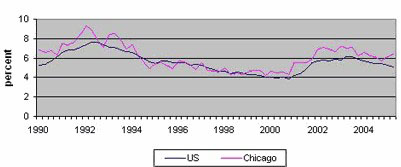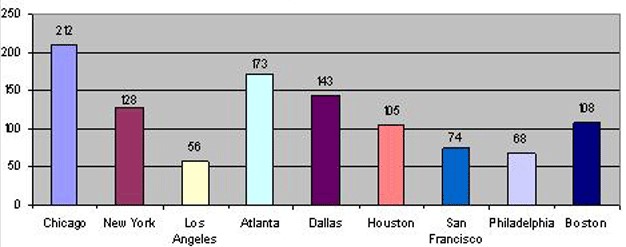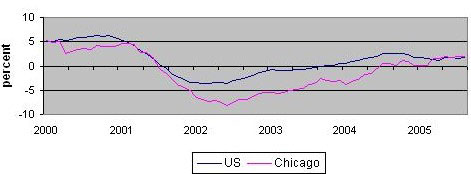Chicago — Regional capital or global business center?
The Chicago economy is expanding, but the pace of growth is disappointing compared with that experienced during the 1990s. This lagging performance raises some questions about the future. Will Chicago merely serve a supporting role as a services center for the surrounding Midwest, or can Chicago’s businesses expand their reach to more rapidly growing national and global markets?
Robust growth of jobs, income, and population during the 1990s left intact Chicago’s role as capital city of commerce for the broader Midwest, and then some. Some observers of the Chicago economy, including me (Global Chicago book), argued that Chicago was outgrowing its regional character. It was becoming a global city, with market ties and cultural recognition above and beyond the Midwest. This view boded well for the region’s long-term prospects, as the shrinkage in surrounding Midwest manufacturing and agriculture income would not hold Chicago back from a favorable performance among global cities.
However, those rosy predictions are somewhat at odds with the reality of Chicago’s performance over the past 4-5 years. The Chicago area is undoubtedly participating in the U.S. economy’s expansion. The airports are at capacity once again, hotel occupancy rates are climbing, some of the risk exchanges are swaggering a bit with profitability and outreach to foreign markets, and commercial office vacancy rates have leveled off. But the Chicago area economy continues to lag the U.S. economy. This follows a recession that hit the Chicago metropolitan area more severely than it hit the nation overall. Year over year (as of August), the Chicago area’s payroll employment grew just 0.8 percent, compared with 1.7 percent for the nation. The unemployment rate for August stood at 5.9 percent versus the nation’s 4.9 percent (figure 1). This extends a weak performance from year 2000. Annual data show that payroll employment declined -4.1 from 2000 to 2004, versus a -0.2 decline for the nation.
1. Unemployment rate, Chicago vs. U.S. (quarterly average)

So what accounts for the city’s strong performance in the 1990s and what has changed for Chicago in recent years? Business and professional services, finance, and legal soared in the late 1980s and especially during the 1990s. The chart below, or something like it, is a bragging point for the city’s premier marketing promoter, World Business Chicago. In the 1990s, the Chicago area created more absolute jobs than other U.S. metro areas in the business and professional service industries, such as advertising, management consulting, accounting and the like. Chicago’s pace of growth didn’t keep up with some Sun Belt cities such as Atlanta and Dallas, where population was also growing strongly, but its performance was still outstanding. Chicago business service jobs climbed by 38 percent from 1990 to 2000, versus 54 percent for the nation.
2. Professional and business services job growth

This performance is also notable because of the simultaneous upheaval in the region’s traditional manufacturing base. By the early 1990s, Chicago area jobs in business services, legal, and finance came to exceed manufacturing. The city re-invented itself as a professional and business services center and business meeting place, while manufacturing jobs gave way to labor-saving productivity gains and manufacturing companies moved to smaller towns and overseas. Chicago became a powerhouse in business service headquarters, growing and attracting firms with global reach and stature such as Arthur Andersen and Leo Burnett. During the 1990s, Chicago gained 13 large company headquarters (Chicago Fed Letter). Convention and business meeting attendance continued to climb, along with Chicago’s travel connections to foreign business capitals.
But the declines in the pace of Chicago’s economic growth during the early years of this new century cause us to ask how much progress Chicago has really made in moving beyond its regional role. From 2000 to 2002, the Midwest’s payroll employment decline was about double the nation’s, and Chicago’s job decline followed the region’s fortunes rather than taking a more independent course. This might be because Chicago’s service industries sell to local midwestern customers who manufacture and farm.
If we look at the recent performance of Chicago’s business service sector (below), the deviation from national performance is below par in this very arena where Chicago had been doing so well during the 1990s. Up until the last few months, year over year job gains had fallen well short of the nation over the past 3-4 years.
3. Professional, scientific, and technical services, year-over-year job growth — January 1990-August 2005

At the tail end of the chart above, some observers will find hope in the evidence that professional/business service job growth in the metro area is showing renewed signs of life. A competing hypothesis to Chicago’s confining destiny as a regional capital would argue that Chicago has experienced some unique and transitory shocks to its business service economy during the early years of the new century. These might include the evaporation of Arthur Andersen, the post-September 11 decline in business travel, and the fallout from overinvestment and expansion in IT/tech-related goods and services in the 1990s that left Chicago’s burgeoning tech consulting businesses with excess payrolls. As the metro area economy works through these shocks, Chicago may rediscover its path to success as a global city—a city “with a head on its shoulders” rather than solely a “city of big shoulders.”
Indeed, it is this future that the City of Chicago is banking on as it launches plans for a $14.7 billion expansion and reconfiguration of Chicago O’Hare International Airport.








